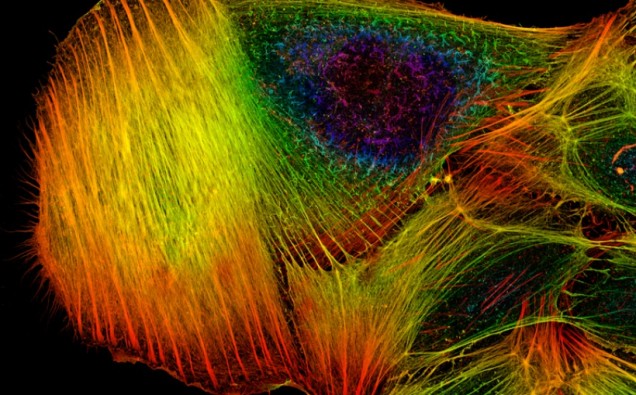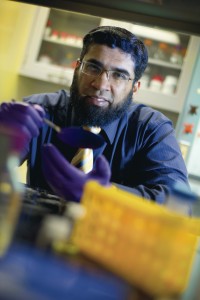
In what could be a major breakthrough in fighting cancer, a Pakistan-origin Texas University electrical engineer has developed a device that can locate cells of the deadly disease in its initial stages.
The inventive device will make it possible to start treatment earlier than allowed with current technology.
The novel method designed by Samir Iqbal, Associate Professor in the Electrical Engineering Department at the University of Texas at Arlington (UTA), and his team is being seen as a major development, one that would revolutionize treatment of the deadly disease, that defies detection in early stages.
Iqbal’s achievement has been hailed as one of the most important breakthroughs Pakistani-Americans have achieved in the field of medicine and health. Years ago, late Dr. Ayub Ommaya invented the Ommaya Reservoir, which is used to treat brain tumors. Besides some of the leading doctors and surgeons in the United States are of Pakistani origin. There are more than 20,000 highly qualified Pakistani physicians in the United States.
Cancer is the second leading cause of death that American Cancer Society says is diagnosed in one million people every year in the United States alone.
Using the inherent properties of the cell walls, the team created a nanotextured wall that “fools blood samples” into thinking its actual tissue,” Iqbal, a Pakistani-American scientist, says while explaining the new method.
“The cancer cells behave differently as they come into contact with the nanotextured walls. They dance.”
Identifying those “dancing cells” will help doctors pinpoint cancer cells and start their treatment earlier than even allowed by the current technology, says a UTA statement.
Also referred to as malignant tumors and neoplasm, cancer causes a rapid creation of abnormal cells that grow beyond their usual boundaries and spread to other organs. This latter process is called metastasizing, the major cause of death from cancer. Approximately 14 million new cases and 8.2 million cancer-related deaths were reported in 2012.
“Discovering the cancer earlier, before it metastasizes, is essential to surviving caner,” Iqbal said.” Our device has the potential to do that.”
Before joining UTA in 20017, Iqbal obtained a bachelor’s degree in electrical engineering from NED University of Engineering and Technology in Karachi. He came to the United States for his postgraduate studies and received a PhD from the University of Purdue in 2007.
Iqbal worked on the project with Young-tae Kim, a UTA associate professor in the Bioengineering Department, Muhymin Islam, A STEM doctoral candidate; and engineering students Mohammad Motasim Bellah, Adeel Sajid and Mohammad Raziul Hasan.
He detailed his team’s results in a paper called “Effects of Nanotexture on Electrical Profiling of Single Tumor Cell and Detection of Cancer from Blood in Microfluidic Channels” published in nature.com’s Scientific Reports.
The published results stem from a $480,000 National Science Foundation grant Iqbal received in 2014 that funded the design and creation of the device. The bright engineer-innovator has received nearly $1.4 million in grants since his arrival at UTA. Iqbal is also an adjunct professor in the Department of Urology at UT Southwestern Medical Center.
“Dr Iqbal and his colleagues are bringing engineering innovation to meet the challenge of early cancer detection,” said Khosrow Behbehani, Dean of the UTA College of Engineering, who termed his research as “groundbreaking”.
“Dr. Iqbal’s device could greatly improve cancer survival rates, which is good news for humanity. There are very few people around the world whose lives have not been touched by this dreadful disease.
Taking a major initiative in the fight against cancer, the Obama administration this month announced a new $1 billion “Moonshot” initiative to eliminate caner. A report by the White House says more than 1.6 million new cases of cancer will be diagnosed and cancer can kill an estimated 600,000 Americans in 2016.
Iqbal’s discovery could draw support from the National Cancer Moonshot, which will work to accelerate new research efforts and aims to bring about a decade’s worth of advances in five years, making more therapies available to more patients.
The Moonshot initiative will begin immediately with $195 million in new cancer activities at the National Institute of Health in fiscal year 2016.
Iqbal’s discovery will add to recent advances in genomic and proteomic technologies which have greatly increased the sensitivity of methods to detect markers of caner – raising the possibility of using such methods for screening and early detection of cancer.















